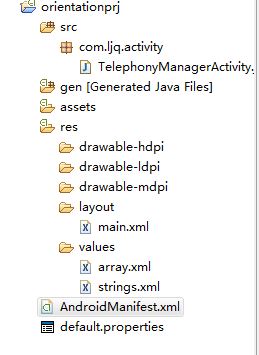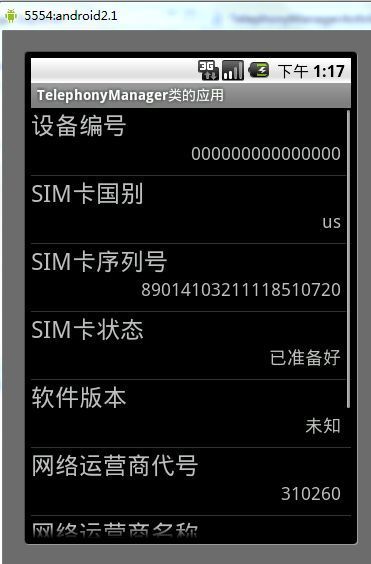Android之TelephonyManager类的使用案例
目录结构

main.xml布局文件
<?
xml version
=
"
1.0
"
encoding
=
"
utf-8
"
?>
<
LinearLayout xmlns:android
=
"
http://schemas.android.com/apk/res/android
"
android:orientation
=
"
vertical
"
android:layout_width
=
"
fill_parent
"
android:layout_height
=
"
fill_parent
"
>
<
ScrollView android:fillViewport
=
"
true
"
android:layout_width
=
"
fill_parent
"
android:layout_height
=
"
fill_parent
"
>
<
ListView android:id
=
"
@+id/listView
"
android:layout_width
=
"
fill_parent
"
android:layout_height
=
"
fill_parent
"
/>
</
ScrollView
>
</
LinearLayout
>
array.xml文件
<?
xml version
=
"
1.0
"
encoding
=
"
utf-8
"
?>
<
resources
>
<
string
-
array name
=
"
listItem
"
>
<
item
>
设备编号
</
item
>
<
item
>
SIM卡国别
</
item
>
<
item
>
SIM卡序列号
</
item
>
<
item
>
SIM卡状态
</
item
>
<
item
>
软件版本
</
item
>
<
item
>
网络运营商代号
</
item
>
<
item
>
网络运营商名称
</
item
>
<
item
>
手机制式
</
item
>
<
item
>
设备当前位置
</
item
>
</
string
-
array
>
<
string
-
array name
=
"
simState
"
>
<
item
>
状态未知
</
item
>
<
item
>
无SIM卡
</
item
>
<
item
>
被PIN加锁
</
item
>
<
item
>
被PUK加锁
</
item
>
<
item
>
被NetWork PIN加锁
</
item
>
<
item
>
已准备好
</
item
>
</
string
-
array
>
<
string
-
array name
=
"
phoneType
"
>
<
item
>
未知
</
item
>
<
item
>
GSM
</
item
>
<
item
>
CDMA
</
item
>
</
string
-
array
>
</
resources
>
清单文件
<?
xml version
=
"
1.0
"
encoding
=
"
utf-8
"
?>
<
manifest xmlns:android
=
"
http://schemas.android.com/apk/res/android
"
package
=
"
com.ljq.activity
"
android:versionCode
=
"
1
"
android:versionName
=
"
1.0
"
>
<
application android:icon
=
"
@drawable/icon
"
android:label
=
"
@string/app_name
"
>
<
activity android:name
=
"
.TelephonyManagerActivity
"
android:label
=
"
@string/app_name
"
>
<
intent
-
filter
>
<
action android:name
=
"
android.intent.action.MAIN
"
/>
<
category
android:name
=
"
android.intent.category.LAUNCHER
"
/>
</
intent
-
filter
>
</
activity
>
</
application
>
<
uses
-
sdk android:minSdkVersion
=
"
7
"
/>
<
uses
-
permission android:name
=
"
android.permission.ACCESS_COARSE_LOCATION
"
/>
<
uses
-
permission android:name
=
"
android.permission.READ_PHONE_STATE
"
/>
</
manifest
>
TelephonyManagerActivity类
package
com.ljq.activity;
import
java.util.ArrayList;
import
android.app.Activity;
import
android.content.Context;
import
android.os.Bundle;
import
android.telephony.TelephonyManager;
import
android.view.Gravity;
import
android.view.View;
import
android.view.ViewGroup;
import
android.widget.BaseAdapter;
import
android.widget.LinearLayout;
import
android.widget.ListView;
import
android.widget.TextView;
public
class
TelephonyManagerActivity
extends
Activity {
private
ListView listView
=
null
;
private
TelephonyManager tm
=
null
;
private
String[] phoneType
=
null
;
private
String[] simState
=
null
;
private
String[] listItems
=
null
;
ArrayList
<
String
>
listValues
=
new
ArrayList
<
String
>
();
BaseAdapter adapter
=
new
BaseAdapter(){
public
int
getCount() {
return
listItems.length;
}
public
Object getItem(
int
position) {
return
listItems[position];
}
public
long
getItemId(
int
position) {
return
position;
}
public
View getView(
int
position, View convertView, ViewGroup parent) {
LinearLayout ll
=
new
LinearLayout(TelephonyManagerActivity.
this
);
ll.setOrientation(LinearLayout.VERTICAL);
TextView tvItem
=
new
TextView(TelephonyManagerActivity.
this
);
tvItem.setTextSize(
24
);
tvItem.setText(listItems[position]);
tvItem.setGravity(Gravity.LEFT);
//
设置在父容器中的对齐方式
ll.addView(tvItem);
TextView tvValue
=
new
TextView(TelephonyManagerActivity.
this
);
tvValue.setTextSize(
18
);
//
设置字体大小
tvValue.setText(listValues.get(position));
//
设置显示的内容
tvValue.setPadding(
0
,
0
,
10
,
10
);
//
设置四周边界
tvValue.setGravity(Gravity.RIGHT);
ll.addView(tvValue);
return
ll;
}
};
@Override
public
void
onCreate(Bundle savedInstanceState) {
super
.onCreate(savedInstanceState);
setContentView(R.layout.main);
listItems
=
getResources().getStringArray(R.array.listItem);
simState
=
getResources().getStringArray(R.array.simState);
phoneType
=
getResources().getStringArray(R.array.phoneType);
tm
=
(TelephonyManager)getSystemService(Context.TELEPHONY_SERVICE);
listView
=
(ListView)findViewById(R.id.listView);
initListValues();
listView.setAdapter(adapter);
}
/**
* 获取各个数据项的值
*/
public
void
initListValues(){
listValues.add(tm.getDeviceId());
//
获取设备编号
listValues.add(tm.getSimCountryIso());
//
获取SIM卡国别
listValues.add(tm.getSimSerialNumber());
//
获取SIM卡序列号
listValues.add(simState[tm.getSimState()]);
//
获取SIM卡状态
listValues.add((tm.getDeviceSoftwareVersion()
!=
null
?
tm.getDeviceSoftwareVersion():
"
未知
"
));
//
获取软件版本
listValues.add(tm.getNetworkOperator());
//
获取网络运营商代号
listValues.add(tm.getNetworkOperatorName());
//
获取网络运营商名称
listValues.add(phoneType[tm.getPhoneType()]);
//
获取手机制式
listValues.add(tm.getCellLocation().toString());
//
获取设备当前位置
}
}
运行结果
